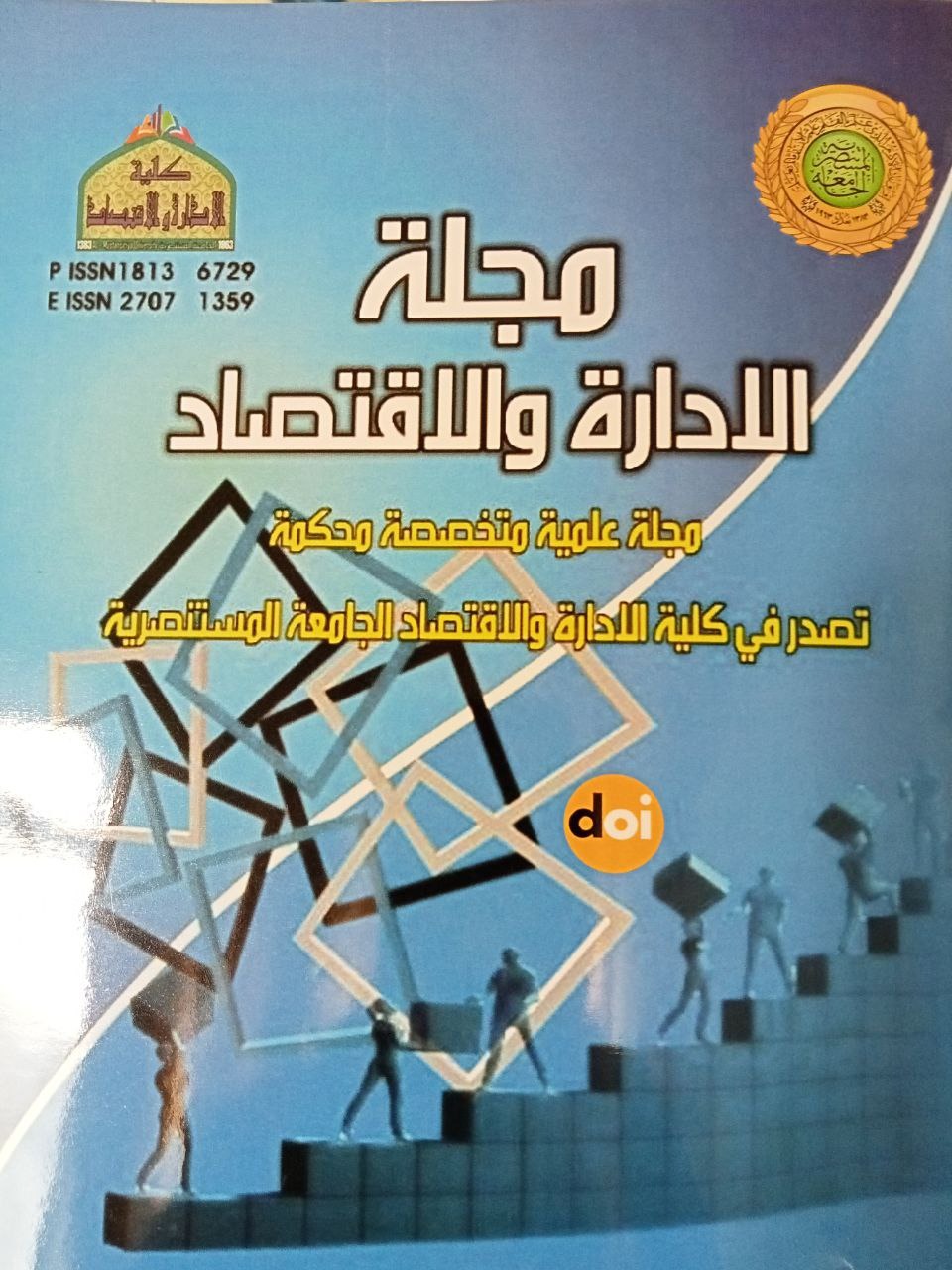Abstract
This research aims to determine the level of application of Total Quality Management requirements in the Excellence Department in the two ministries according to the EFQM model, as well as to explain the nature of the relationship between the requirements of Total Quality Management and the level of Excellence Management according to the aforementioned model and test the impact of requirements in the management of excellence, and build an electronic service to support search variables. As the research problem was identified as (the lack of perception among workers in the ministries researched of the importance of implementing the requirements of Total Quality Management and strengthening commitment to it, leading to the management of excellence according to the EFQM model) in those ministries.
The research reached a percentage of the gap with requirements, as it reached 61% in the Ministry of Labor and Social Affairs, 75% in the Ministry of Culture, Tourism and Antiquities, as for the EFQM gap, it reached 78% in the Ministry of Labor and Social Affairs, 80% in the Ministry of Culture, Tourism and Antiquities. The two researchers also set keys for improvement and development for the variables, and the results of the statistical methods used in the research indicated that there is a commitment to implement the requirements of total quality management in the Ministry of Labor and Social Affairs), and there is a relationship and influence in the management of excellence according to the EFQM model as for the Ministry of Culture and Tourism And the effects did not appear as a result, due to their lack of commitment to implementing the requirements of total quality management, which affected the Department of Excellence), in addition to weakness in the two ministries researched in presenting their results to reach the Department of Excellence, and the levels of conformity percentage of the two ministries appeared as follows: (Ministry of Labor and Social Affairs: Level 1, Ministry Culture, Tourism and Antiquities: Level Two), as strengthening the strengths and seizing opportunities for improvement by the two ministries will lead to strengthening their position in the future.
The research reached a percentage of the gap with requirements, as it reached 61% in the Ministry of Labor and Social Affairs, 75% in the Ministry of Culture, Tourism and Antiquities, as for the EFQM gap, it reached 78% in the Ministry of Labor and Social Affairs, 80% in the Ministry of Culture, Tourism and Antiquities. The two researchers also set keys for improvement and development for the variables, and the results of the statistical methods used in the research indicated that there is a commitment to implement the requirements of total quality management in the Ministry of Labor and Social Affairs), and there is a relationship and influence in the management of excellence according to the EFQM model as for the Ministry of Culture and Tourism And the effects did not appear as a result, due to their lack of commitment to implementing the requirements of total quality management, which affected the Department of Excellence), in addition to weakness in the two ministries researched in presenting their results to reach the Department of Excellence, and the levels of conformity percentage of the two ministries appeared as follows: (Ministry of Labor and Social Affairs: Level 1, Ministry Culture, Tourism and Antiquities: Level Two), as strengthening the strengths and seizing opportunities for improvement by the two ministries will lead to strengthening their position in the future.
Keywords
EFQM
Excellence Management (EM)
Radar.
Total Quality Management (TQM) requirements
Abstract
يهدف هذا البحث إلى تحـديد مسـتوى تطبيق متطلبات إدارة الجودة الشاملة في إدارة التميز لدى الوزارتين على وفق نموذج (EFQM)، فضلاً عن بيان طبيعة العلاقة بين متطلبات إدارة الجودة الشاملة ومسـتوى إدارة التميز على وفق النموذج المذكور وإختبار تأثير متطلبات في إدارة التميز، وبناء خدمة الالكترونية لدعم متغيرات البحث. اذ تم تحديد مشكلة البحث بـ(ضعف الإدراك لدى العاملين في الوزارات المبحوثة بأهمية تطبيق متطلبات إدارة الجودة الشاملة وتعزيز الإلتزام بها وصولاً الى إدارة التميز على وفق نموذج EFQM))) في تلك الوزارات.
توصل البحث إلى نسبة الفجوة بمتطلبات إذ بلغت في (وزارة العمل والشؤون الإجتماعية 61%، وزارة الثقافة والسياحة والآثار 75%)، أمّا فيما يخص فجوة إدارة التميز (EFQM) بلغت في (وزارة العمل والشؤون الإجتماعية 78%، وزارة الثقافة والسياحة والآثار 80%)، كما وضعت الباحثتين مفاتيح للتحسين والتطوير للمتغيرين، وبينت نتائج الأساليب الإحصائية المستخدمة في البحث أن هناك إلتزاماً في تطبيق متطلبات إدارة الجودة الشاملة في وزارة العمل والشؤون الإجتماعية)، وتوجد علاقة إرتباط وتأثير في إدارة التميز على وفق نموذج (EFQM أما )وزارة الثقافة والسياحة والآثار لم تظهر نتيجة، لعدم إلتزامها بتطبيق متطلبات إدارة الجودة الشاملة مما أثر في إدارة التميز) ، فضلاً عن ضعف في الوزارتين المبحوثتين في تقديم نتائجهما للوصول إلى إدارة التميز، وظهرت مستويات نسبة المطابقة للوزارتين كالآتي: (وزارة العمل والشؤون الإجتماعية: المستوى الأول، وزارة الثقافة والسياحة والآثار: المستوى الثاني)، إذ أن تعزيز نقاط القوة وإقتناص فرص التحسين من قبل الوزارتين سيؤدي إلى تعزيز مكانتهما مستقبلاً.
توصل البحث إلى نسبة الفجوة بمتطلبات إذ بلغت في (وزارة العمل والشؤون الإجتماعية 61%، وزارة الثقافة والسياحة والآثار 75%)، أمّا فيما يخص فجوة إدارة التميز (EFQM) بلغت في (وزارة العمل والشؤون الإجتماعية 78%، وزارة الثقافة والسياحة والآثار 80%)، كما وضعت الباحثتين مفاتيح للتحسين والتطوير للمتغيرين، وبينت نتائج الأساليب الإحصائية المستخدمة في البحث أن هناك إلتزاماً في تطبيق متطلبات إدارة الجودة الشاملة في وزارة العمل والشؤون الإجتماعية)، وتوجد علاقة إرتباط وتأثير في إدارة التميز على وفق نموذج (EFQM أما )وزارة الثقافة والسياحة والآثار لم تظهر نتيجة، لعدم إلتزامها بتطبيق متطلبات إدارة الجودة الشاملة مما أثر في إدارة التميز) ، فضلاً عن ضعف في الوزارتين المبحوثتين في تقديم نتائجهما للوصول إلى إدارة التميز، وظهرت مستويات نسبة المطابقة للوزارتين كالآتي: (وزارة العمل والشؤون الإجتماعية: المستوى الأول، وزارة الثقافة والسياحة والآثار: المستوى الثاني)، إذ أن تعزيز نقاط القوة وإقتناص فرص التحسين من قبل الوزارتين سيؤدي إلى تعزيز مكانتهما مستقبلاً.
Keywords
: متطلبات إدارة الجودة الشاملة (TQM)، إدارة التميز (EM)، EFQM، RADAR .
